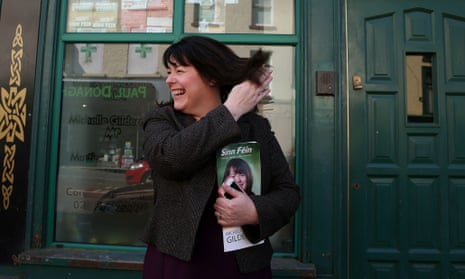Sinn Féin will never abandon its policy of boycotting the House of Commons, according to one of the party’s Westminster parliamentary candidates.
Michelle Gildernew, who is defending her Fermanagh/South Tyrone seat against a single unionist challenger in what is regarded as Sinn Féin’s toughest general election fight, insisted she was misquoted in a local newspaper, which reported that she had said she would “never say never” on the question of a boycott.
All five Sinn Féin MPs refused to take their seats on the Commons’ benches in line with the party’s historic policy of boycotting Westminster.
Supporters of Sinn Féin within the British Labour party have urged the mainstream republican movement to rethink its boycott, pointing out that the party would wield more influence if Ed Miliband needed their support as part of a post-election deal involving Scottish, Welsh and Irish nationalists.
But Gildernew, whose main opponent is the Ulster Unionist candidate Tom Elliott, denied she had wavered in any way from the party’s boycott policy.
“I was misquoted in that instance. I said I personally was a never-say-never type of person but in terms of taking our seats in Westminster, my party colleagues and I are saying never,” she said. “Issues that affect the Irish electorate need to be discussed in Ireland by Irish elected representatives.
“Our time is better spent in our constituencies, dealing with constituency queries and getting to know our constituents rather than sitting on the green benches debating issues that are not relevant in the North. Sinn Féin is an abstentionist party and that position has been endorsed by the electorate at successive elections,” Gildernew said.
The former agriculture minister in the devolved government at Stormont continued: “All of the major achievements of the peace and political processes have come about as a result of direct negotiations between republicans and the British government, not from the green benches of Westminster.”
First elected to represent the border constituency in 2001 with a majority of 53, her lead over the last united unionist candidate in 2010 narrowed to just four votes.
Rejecting claims from both unionists and the rival nationalist SDLP that voting for a boycott party is a wasted vote, particularly with the prospect of a hung parliament, Gildernew added: “I don’t believe I need to sit on a green bench in Westminster and have a wee nap, take an oath to the Queen, take my money and not turn up, which is what the vast majority of the other MPs [from Northern Ireland] do.
“The people who get paid generally don’t turn up because they know they are irrelevant in Westminster.”
Sinn Féin takes up its parliamentary allowances from Westminster despite not sitting on the Commons’ benches.
Dropping its boycott could risk another damaging split within the ranks of mainstream republicanism.
In addition, the party’s prime focus over the next few months will be building its campaign for the general election in the Irish republic.
Sinn Féin is currently running second behind the ruling party Fine Gael in the opinion polls and some commentators believe Gerry Adams and his party could participate in a new government formed in the historically resonant year of 2016 – the 100th anniversary of the Easter rising against British rule.
